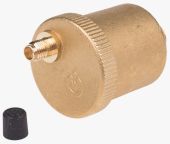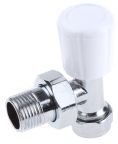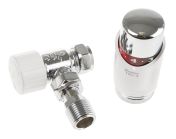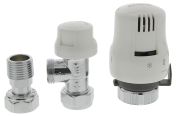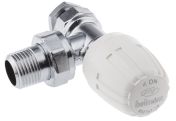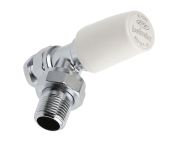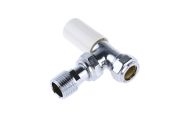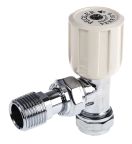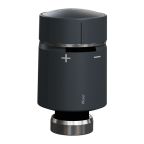Radiator Valves
Thermostatic radiator valves, or TRVs, are used in heating systems to change the flow of hot water to a radiator. This allows the user to regulate the temperature of a particular room, independent of the boiler setting, or any temperature control valve prior to that radiator.
The radiator valves are self-regulating, and typically have a maximum pre-set temperature. By only heating a room as needed, TRVs can reduce heating bills and prevent energy being wasted.
How do TRVs work?
The thermostatic head of a TRV has a sensor which contains a wax or similar material that expands in response to rising temperatures, and contracts when cooling. This sensor in turn operates a valve that regulates the flow of hot water passing through it. When a warmer temperature is reached, the flow is constricted. This is what allows the thermostatic valve to keep a room consistently heated.
Applications:-
TRVs usually have a manual setting, allowing you to set them at the desired operating temperature to suit the room the radiator or towel warmer is in. Settings normally cover anything from basic frost protection, to keeping a bedroom cosy. To keep an optimum temperate in commercial or domestic properties, thermostatic radiator valves are essential.
Where Should I Install a Thermostatic Radiator Valve?
A thermostatic radiator valve is installed in the pipe that feeds from boiler to the radiator. Because they rely on sensing the room's temperature, it is important to make sure TRVs are not covered up or insulated. For instance, if the TRV is covered with curtains, its sensor may perceive the room temperature as warmer than it actually is, and may result in the room not being heated as needed.
What type of Thermostatic Radiator Valve Should I Buy?
The RS range includes straight and right angle TRV fittings, in brass or chrome plated brass to match your pipework accordingly.
There are also kits available that come with lockshield valves. Lockshields are an additional valve that is usually placed on the return pipe, and can be adjusted to increase or decrease the flow rate of the hot water. This helps 'balance' the radiator, and makes sure it is operating as efficiently as possible. Lockshields typically come with plastic caps to prevent them being accidentally tampered with.
9 Products showing for Radiator Valves
Popular Searches
Related links
- Schneider Electric Thermoplastic Threaded Thermostatic Radiator Valve
- Altecnic Brass 1/2 in BSP to 1/2 in BSP Thermostatic Radiator Valve
- Drayton Chrome Plated Brass 1/2 in BSP to 1/2 in BSP Thermostatic Radiator Valve
- RS PRO Brass 15 mm Male to 1/2 in Male Manual Radiator Valve
- Pegler Yorkshire Chrome Plated Brass 15 mm Compression to 1/2 in BSP Manual Radiator Valve
- Solenoid Valve Adapter for use with RF Radiator Thermostat
- Watts Brass Thermostatic Mixing Valve, 19.05mm
- Hydraulic Valves & Manifolds
